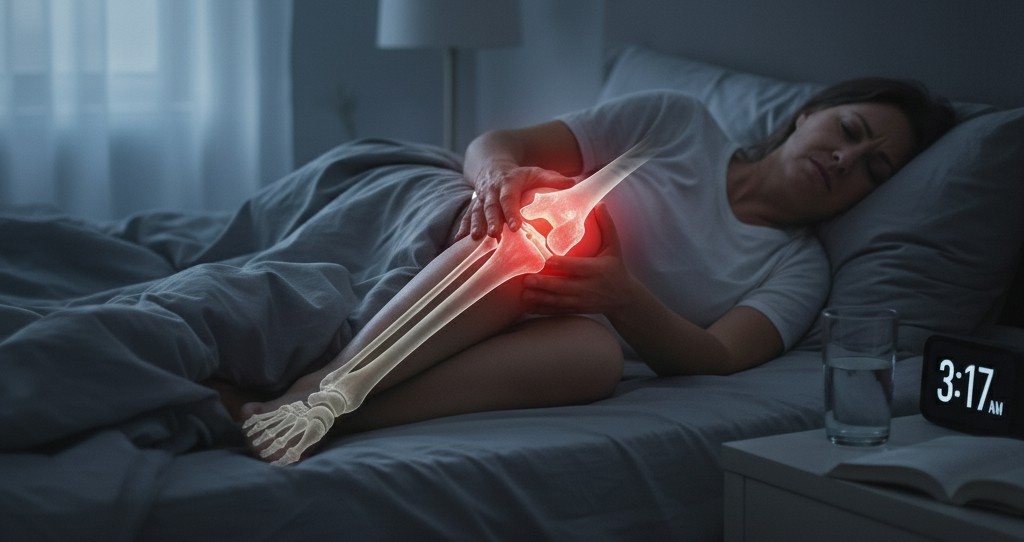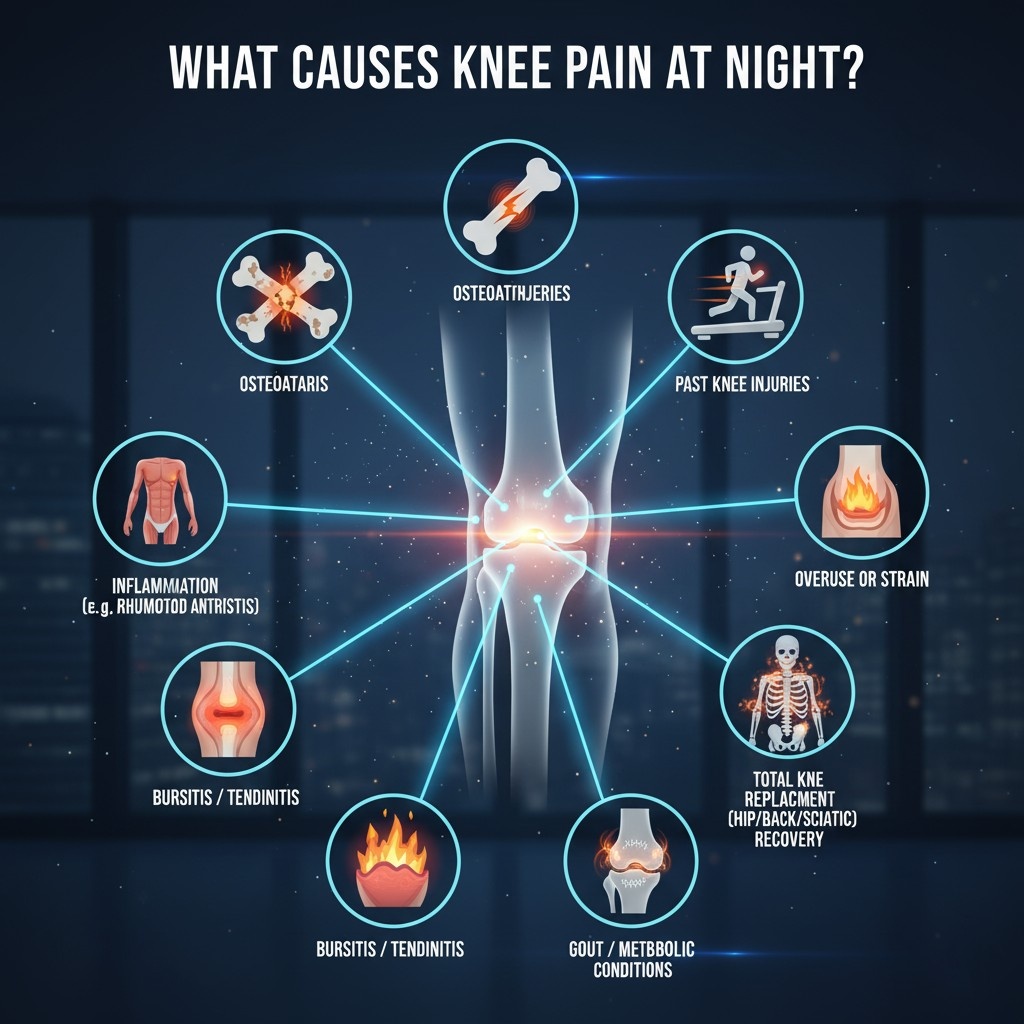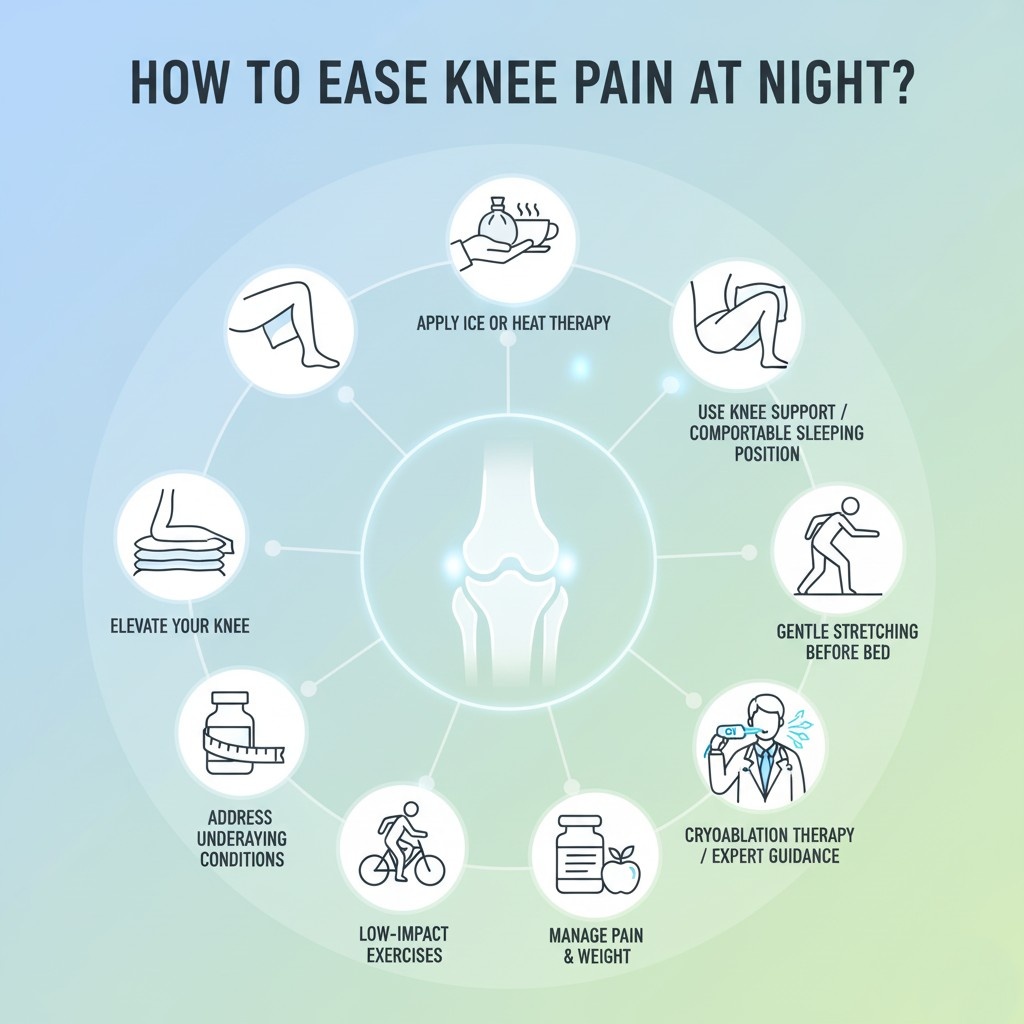Knee pain at night - Causes, symptoms & relief tips

Waking up in the middle of the night because of knee pain is more common than you might think, and it can seriously affect your sleep and quality of life.
Whether it’s a burning sensation, or a sharp ache that makes it hard to turn in bed, there are multiple reasons why your knees may hurt after dark. From degenerative conditions like osteoarthritis to injuries, overuse, or inflammation, understanding the cause is key to effective management.
This blog covers the main triggers, common symptoms, and simple yet effective ways on how to relieve knee pain at night, helping you rest better and maintain healthy, strong joints.
What causes knee pain at night?
Knee pain at night can range from a mild ache to sharp, severe pain that disrupts your rest
Here are the main reasons why knee pain often worsens at night:
- Osteoarthritis – Degeneration of knee cartilage often leads to stiffness and burning knee pain at night, especially when lying down.
- Rheumatoid arthritis and other inflammatory conditions – Swelling and inflammation in the joint can worsen at night.
- Past knee injuries – Torn ligaments, meniscus damage, or fractures can cause lingering pain after activity.
- Overuse or strain – Repetitive movements, sports, or heavy physical activity during the day can cause the knee to become sore at night.
- Bursitis or tendinitis – Inflammation of the knee’s bursae or tendons can trigger burning knee pain at night.
- Gout or other metabolic conditions – Sudden uric acid buildup can cause intense nighttime pain.
- Total knee replacement recovery – Post-surgical discomfort often intensifies when the patient is at rest.
- Referred pain from hip, back, or sciatic nerve – Pain from nearby joints or nerves can be felt in the knee, especially when lying down.
- Weak muscles around the knee – Poor support and stability can increase pressure on the joint, leading to severe knee pain at night.
- Sleeping positions or pressure on the knee – Certain positions can strain the joint or compress nerves, worsening discomfort.

What are the symptoms of knee pain at night?
- Throbbing or aching pain that can disrupt sleep
- Burning or sharp pain, sometimes felt as stabbing sensations
- Stiffness and reduced mobility, making it hard to bend or straighten the knee after lying down
- Swelling or inflammation, with the knee feeling warm or puffy
- Knee pain at night when lying down, causing discomfort in certain positions
- Pain radiating to the leg, hip, or surrounding muscles and joints
- Inner knee pain worse at night, often localized and persistent
- Pain that wakes you up during the night, interrupting rest
- Tenderness to touch around the knee joint
- Weakness or instability, giving the feeling that the knee may give out while moving in bed
How to ease knee pain at night?
- Apply ice or heat therapy: Using a cold pack can reduce inflammation, while a warm compress can relax stiff muscles. Alternating between both can provide soothing relief.
- Use a knee support or cushion: A soft knee brace, pillow, or wedge can provide extra support and prevent uncomfortable positions during sleep.
- Elevate your knee: Placing a pillow under your leg while sleeping can reduce swelling and pressure, making it easier to manage knee pain at night when lying down.
- Gentle stretching before bed: Performing light stretches for the knee, hamstrings, and quadriceps can relax muscles and reduce stiffness overnight.
- Maintain a comfortable sleeping position: Avoid lying directly on the painful knee. Sleeping on your back or side with a pillow between the knees helps reduce pressure and supports knee and leg pain at night.
- Weight management: Keeping your weight in a healthy range reduces stress on your knees and can help minimize nighttime pain.
- Manage pain with medication: Over-the-counter pain relievers or anti-inflammatory medications can reduce pain and inflammation, as advised by a doctor.
- Practice low-impact exercises during the day: Activities like swimming, cycling, or walking strengthen knee-supporting muscles, helping reduce night-time pain.
- Address underlying conditions: Managing arthritis, gout, or post-surgical recovery under a doctor’s guidance can significantly improve night-time comfort.
- Cryoablation therapy: Cryoablation is a minimally invasive procedure that uses controlled cold energy to freeze and numb the pain nerves around the knee. This advanced technique offers long-lasting relief from chronic knee pain without the need for major surgery or extended downtime.

Tips for better sleep despite knee pain
- Adjust your sleeping position by lying on your back or side with a pillow between your knees to reduce pressure and discomfort
- Use supportive pillows or cushions under or around your knee for added stability and comfort
- Apply a warm compress to relax tight or stiff muscles or ice to reduce inflammation before bed
- Slightly elevate your leg with a pillow to reduce swelling and improve comfort
- Perform gentle stretches of the quadriceps, hamstrings, and calves before bed to relieve stiffness
- Ensure your mattress and bedding provide proper support to avoid worsening pain
- Maintain a regular sleep schedule to help improve rest, even if knee pain wakes you up at night
- Use over-the-counter pain medication or topical treatments if recommended by a doctor
- Try relaxation techniques such as deep breathing, meditation, or gentle yoga to reduce tension
- Limit daytime strain on the knee by avoiding overexertion or prolonged standing to prevent knee pain only at night and ensure better sleep
Visit Dr Mohamed Elfekky for knee pain treatment in Dubai
Living with knee pain at night can be frustrating — it disturbs your sleep, limits your movement, and affects your overall well-being. With proper treatment and guided rehabilitation, you can regain mobility, reduce pain, and enjoy restful nights again.
For expert knee pain treatment in Dubai, visit Dr. Mohamed Elfekky, leading Consultant and one of Dubai’s best Orthopedic Surgeons with over 25 years of experience in advanced orthopedic and joint care.
Known for his precision, compassionate care, and exceptional results, he specializes in both traditional and modern pain management techniques, including Cryoablation therapy — a minimally invasive procedure that uses controlled cold energy to freeze and numb pain nerves around the knee for long-lasting relief.
If knee pain is disturbing your sleep or making daily activities difficult, don’t wait for it to get worse. Schedule a consultation with Dr. Mohamed Elfekky today.
FAQs
What is stem cell therapy for knee osteoarthritis?
It’s a regenerative treatment using fat-derived mesenchymal stem cells to reduce inflammation, promote cartilage repair, and improve knee function.
Is stem cell therapy effective for knee osteoarthritis?
Many patients report reduced pain and improved mobility. However, results vary, and long-term studies are still ongoing.
Are there any risks involved in stem cell therapy?
Risks are minimal as the therapy uses your own fat cells. Temporary swelling or soreness at the injection site is the most common side effect.
Who is a good candidate for stem cell therapy for osteoarthritis (OA)?
Ideal candidates are in the early to moderate stages of osteoarthritis (OA), not eligible for surgery, or want to avoid knee replacement.
About Doctors
Dr Mohamed Elfekky, Orthopedic Surgeon in Dubai, is a trusted expert in knee and joint care with over 25 years of experience in advanced, minimally invasive, and robotic-assisted surgeries. Read more
Social link
Recent Blog

Total Knee Replacement Pain at Night
Total Knee Replacement Pain at Night : What to Expect


